高中英语_Music教学设计学情分析教材分析课后反思
高中英语_Book2 unit5 Music教学设计学情分析教材分析课后反思

Unit 5 The band that wasn’tⅠ.Warming upDo you like listening to music ? And why?_____________________________________________________________________ Could you list some styles of music ?_____________________________________________________________________Ⅱ.ReadingFast reading1.To predict what the text is mainly about .2. To find out top sentences of each paragraph_________________________________________________________________________________________________________________________________-________________________________________________________________________________________________________________________________ Careful readingPara. 11.Why the names of Song Zuying and Liu Huan are mentioned in P1?A. Because they are very famous.B. Because they can sing very well.C. Because the text only want us to know them.D. Because the text is giving us some examples of the famous singers that we might want to be like.2.Translation:Have you ever dreamed of playing in front of thousands of people at a concert , at which everyone is clapping and appreciating your music?_____________________________________________________________________ Para 2:Why do some people form a band? How do people form a band?They may start as…practise music inThey may play to… earn extra money to…Later, they may give performances in_____________________________They hope to…_______________________in a studio andto become millionaires.Para. 3&4 To put the following events in the right orderHad to use actorsProduced their own recordsRelied on other musiciansSang their own songsTo find four musiciansAdvertised in a newspaperSang songs by othersPretended to sing思考:The Monkees wasn’t a real band. why?_____________________________________________________________________ III. SummaryHow did the Monkees develop?It began as a ______________.As some actors could not sing well, they had to ________________________. So during the broadcast, they just_____________________.After a year_______, they started to _________________________________ like a real band.Then they _____________________and _____________. They became very popular.In about 1970, the band __________.In the mid-1980s, they ___________.In 1996, they__________________________.Ⅳ. Discussion2018Taixi School Music Festival(2018泰西校纪音乐节) is coming . It's your turn to form your own band.(pick a name kind of the music practice in… play to passers-bywork well together your own music /songs determinaion )Ⅴ.Homework1.Search more information from/default.htm . /wiki/The_Monkees and write a news report about the Monkees.2 . Learn the song daydream believer by the Monkees.Oh, I could hide 'neath the wings Of the bluebird as she sings.The six o'clock alarm would never ring. Whoops its ringing and I rise,Wipe the sleep out of my eyes. My shavin' razor's cold and it stings.Cheer up, Sleepy Jean. Oh, what can it mean.To a daydream believer And a homecoming queen.You once thought of me As a white knight on a steed.Now you know how happy I can be. Oh, and our good times starts and endWithout dollar one to spend. But how much, baby, do we really need.[Repeat and fade]My love - WestlifeAn empty street an empty house a hole inside my heart I'm all alone and the rooms are getting smallerI wonder how I wonder why I wonder where they areThe days we had the songs we sang togetherOh yeahAnd oh my love I'm holding on foreverReaching for a love that seems so farSo I say a little prayerAnd hope my dreams will take me there Where the skies are blue to see you once again my love Over seas and coast to coastTo find a place I love the mostWhere the fields are green to see you once againMy loveI try to read I go to work I'm laughing with my friendsBut I can't stop to keep myself from thinkingOh noI wonder how I wonder why I wonder where they areThe days we had the songs we sang togetherOh yeahAnd oh my love I'm holding on foreverReaching for a love that seems so farSo I say a little prayerAnd hope my dreams will take me there Where the skies are blue to see you once again my love Over seas and coast to coastTo find a place I love the mostWhere the fields are green to see you once againTo hold you in my armsTo promise you my loveTo tell you from the heartYou're all I'm thinking ofI'm reaching for a love that seems so farSo I say a little prayerAnd hope my dreams will take me there学情分析1. The Students have known something about music.They all love music.2.The Students don’t often use English to express themselves or communicate with others.3.Some students are not active enough in English class because they’re afraid of making mistakes.4.Students: at the age of 15 or 16,full of curiosityeager to show their abilities,expect to win others’ respecthope to succeed in their study,motivated to make progressby teacher’s praise.效果分析本堂课主要想体现新课标形势下的教学模式。
高中英语_Unit 5 Music教学设计学情分析教材分析课后反思

本单元的话题很容易使学生兴趣盎然,思路开阔,有话可谈,作者先以设问的方式引发学生从个人的梦想,生活经历和熟悉的人物等角度来思考或许某一天也可能发生在自己生活中的事,即富有和成名,来逐步切入本文的中心话题本节课的学习目标是学习写一封建议信,按照短语,句子,文章的顺序完成,进行的比较顺利,完成了需要达到的学习目标。
同学们在小组讨论中积极发言,虽然展示的句子有个别错误,但在篇章布局和句子结构上已基本达到既定目标。
在本课的学习中,无论是短语的铺垫还是句子的练习,都为最后的作文做了充足的准备。
本单元的话题是“音乐”和“音乐类型”,内容分三个文段展开,涉及门基乐队,费雷迪和他的乐队等子话题,而其中主篇课文是围绕着门基乐队的形成和成长历程展开的。
用复习的写建议信的单词短语句型, 给世界野生动物保护基金会写一封求助信。
调查研究证明,中国江豚受人类活动影响而濒临灭绝,目前总数不足1,000只。
假设你是李华,请用英文给WWF写一封信,请他们关注这个现象并提供帮助。
内容包括:①说明写信目的;②简述江豚现状;③希望WWF如何帮助。
本节课的课前课中课后环节都突出了学生在评价中的主体地位,有效促进了学生英语学科核心素养的形成,学生在参与这些活动的同时,发展了听说读写看的能力,学生在中外文化的对比中汲取了正确的世界观和价值观,提升了对比、分析、综合、归纳等思维品质,展示了自主学习、拓展学习、合作学习等方面的学习能力。
在今后的教学中,应着重培养学生的书法练习。
普通高中英语课程的具体目标是培养和发展学生在接受高中英语教育后应具备的语言能力、文化意识、思维品质、学习品质、学习能力等学科核心素养。
本节课涉及的是文化意识目标:获得文化意识,理解文化内涵,比较文化异同,汲取文化精华,形成正确的价值观,坚定文化自信,形成自尊、自信、自强的良好品格,举备一定的跨文化沟通和传播中华文化的能力。
高中英语_Uint5 Music教学设计学情分析教材分析课后反思

Book 2 Unit5 Music -----The Band That Wasn’tReading教学设计一、Teaching material(教材分析)This period is the 2nd of the unit 5 and the key part. The topic of the reading passage is about music. The students will be asked to finish pre-reading , reading and comprehending within one period. All the materials and exercises are about different musics. Through reading, the Ss are supposed to learn different kinds of them.二、Teaching aims(教学目标)Knowledge aim:Enable students to learn more about musics.Ability aim:Enable students to review and strengthen some reading skills such as: task1 and task2 .Emotional aim:Enable students to become interested in musics and sing some songs.三、Difficulties and importances(重点难点)1.Enable the students to understand the article and master the new reading skillsof solving some problems like guessing new words, inferring, and understanding the tone of the passage.2.Enble the students to learn to finish a mind map of the passage.四、Learning analysis(学情分析)The class is given to senior one student who has mastered a certain amount of English words and phrases as well as acquired some useful reading strategies. However they still have difficulty in dealing with some problems concerned with guessing new words, inferring, and understanding the tone of the passage.五、Teaching methods(教学方法)Co-operative learning task-based discussion六、Teaching aids(教学手段)利用多媒体一体机、网络资源、自制音像等创设教学情景、问题情景,扩大教学容量,增强教学的趣味性和时效性.七、Teaching procedures教学过程Step1:checking(检查)Ask the students to recite some sentences we have learned.[设计意图] 巩固检查,加强学生的记忆能力.Step2:Warming-up (3 minutes)1.Brain-storming:Discuss with your deskmates。
高中英语_Music教学设计学情分析教材分析课后反思
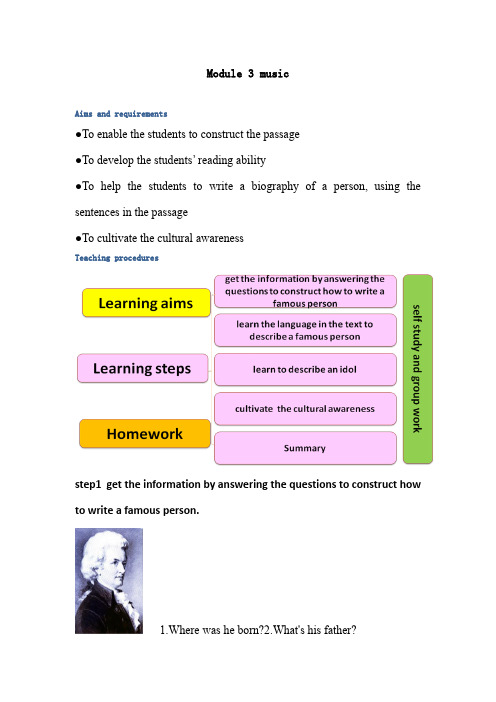
Module 3 musicAims and requirements●To enable the students to construct the passage●To develop the students’ reading ability●To help the students to write a biography of a person, using the sentences in the passage●To cultivate the cultural awarenessTeaching proceduresstep1get the information by answering the questions to construct how to write a famous person.1.Where was he born?2.What's his father?3.How many pieces of music did he compose?4.How long were Mozart and Haydn friends?Fill in the blank.1.He learned to play the harpsichord when he was ____.2.He started composing music whenhe was _____.3.When he was ____, he played the harpsichord in a concert for the Empress of Austria .4.By the time he was ____, he had composed many pieces for the harpsichord ,piano and violin, as well as for orchestras.5.While he was still a ________,he was already a big star and toured Europe giving concerts.6.He only lived ____ years.7.He had musical talent from___________.step2learn the language in the text to describe a famous personCan you find your favourite sentences in the article about……?Then make your own sentences.Show the S’s work.step3learn to describe an idolSince you have known how to write a famous person by learning the text , please write your idol, using the language you've learned from the text.Show the S’s work.step4cultivate the cultural awarenessAs we know, as he grew older, Beethoven began to go deaf. He became completely deaf during the last years of his life, but he continued composing.Question: What do you think of Beethoven as a great composer?Heaven helps those who help themselves.Never give up your dream.step5Summary•How to construct a passage.•How to use the language in the text to describe a famous person•Cultivate the cultural awarenessHomeworkPresent a biography of a famous Chinese musician of composer.学情分析教学对象是高一年级的学生,在必修1的课堂训练和磨合的前提下,他们具备了一定的文本解读意识,但基于英语基础薄弱,在进行整体阅读和学习文本层次构建的教学中,仍需按目标不降难度降的设计思路,坚定的利用英语阅读教学将培养学生思维品质、学习能力等核心素养的道路走下去。
高中英语_【课堂实录】Music教学设计学情分析教材分析课后反思
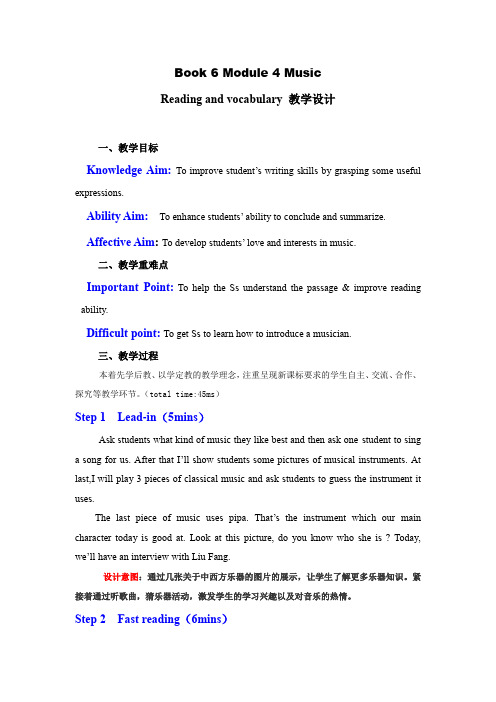
Book 6 Module 4 MusicReading and vocabulary教学设计一、教学目标Knowledge Aim:To improve student’s writing skills by grasping some useful expressions.Ability Aim:To enhance students’ ability to conclude and summarize. Affective Aim: To develop students’ love and interests in music.二、教学重难点Important Point:To help the Ss understand the passage & improve reading ability.Difficult point: To get Ss to learn how to introduce a musician.三、教学过程本着先学后教、以学定教的教学理念,注重呈现新课标要求的学生自主、交流、合作、探究等教学环节。
(total time:45ms)Step 1 Lead-in(5mins)Ask students what kind of music they like best and then ask one student to sing a song for us. After that I’ll show students some pictures of musical instruments. At last,I will play 3 pieces of classical music and ask students to guess the instrument it uses.The last piece of music uses pipa. That’s the instrument which our main character today is good at. Look at this picture, do you know who she is ? Today, we’ll have an interview with Liu Fang.设计意图:通过几张关于中西方乐器的图片的展示,让学生了解更多乐器知识。
高中英语_Music教学设计学情分析教材分析课后反思

Unit5 Music一,教材内容分析人教版必修二第五单元的话题是Music.介绍了各种类别的音乐和门基乐队的形成。
本单元中的”The band that wasn’t”是本课中的精读文章。
文章先通过四个问题引起读者对话题的关注与思考;第二段介绍普通乐队形成的通常过程;第三、四段则描述了门基乐队(The Monkees)由电视节目里的“假”乐队发展为真乐队的特殊历程。
本文学习的关键点在于通过门基乐队与众不同的由“假”变“真”的经历,引导学生了解乐队的成名过程,并领悟乐队成功的要素。
教学目标二、教学目标1、语言知识目标(1)了解有关音乐的词汇;(2)初步学习并掌握课文当中的重点单词和词汇;2、语言技能目标(1)围绕这一课题,使学生掌握快速阅读,详细阅读的技巧,能够寻找主题句或归纳总结每段的大意;训练他们捕捉信息,理解信息并整理信息的能力;(2)能够运用有关于音乐的简单词汇和语句来表达有关音乐话题的相关内容;3、情感态度与文化意识目标(1)了解各种音乐形式及相关的背景知识,深化对音乐知识的认识,提高音乐欣赏力;(2)通过了解门基乐队的发展史,引导学生用辨证和理智的态度看待明星,树立正确的人生观和价值观。
三、教学重点和难点(1)教学重点:①帮助学生总结归纳段落大意(快速浏览)②分析整理课文中的细节阅读(详细阅读)(2)教学难点:推理并理解题目的含义四、教学方法任务型教学法;多媒体辅助教学法;启发式教学法;活动法五,教学过程Step1 warming-up环节设计:1.给学生展示国内外的一些流行歌手的图片2.播放各种类型音乐的音频并让学生匹配3.让学生小组讨论喜欢什么类型的音乐?并说出为什么喜欢听音乐?意图说明:采用视听结合的方法,用音乐家们的图片和一些不同类型的音乐片段作为导入,极大地激发了学生的兴趣,吸引了他们的注意力,使学生从听觉上感受音乐的美妙让学生了解音乐的分类及背景知识引出文章主题。
既有助于学生初步理解和掌握词汇,扫除阅读障碍,又能激发学习的热情与兴趣,培养合作学习的能力Step2 pre-reading环节设计:帮助老师解决问题,向老师推荐一些著名的乐队和他们成名的歌曲。
高中英语_Unit5 Music教学设计学情分析教材分析课后反思
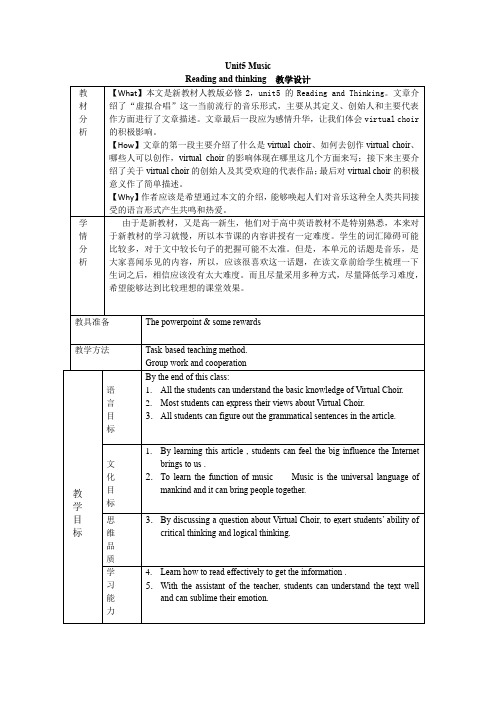
Unit5 Music学情分析进入我校的高中生,英语是极其薄弱学科,很多学生尤其是不太重视英语学习的,缺少恒心和毅力,还有很多学生对英语学习失去了兴趣,甚至放弃了对英语的学习。
他们的主要表现在下面几个方面:1.学习英语的目的不明大多数人把学习英语看作是“被迫无奈”,而没有当作是多掌握了一样人生的语言交流工具。
因此,不少学生缺乏学习动力2. 缺乏积极的学习态度和毅力不少学生对英语学习的努力程度不够。
他们有学好英语的愿望,但缺乏学习的毅力,没有长期努力的思想准备。
他们不愿在英语学习上多花时间与精力,遇到困难很容易产生疲劳感,甚至厌烦感。
作为老师应尽量让课堂充满生气,提高学生自主学习的能力。
所以本节课设计的问题基本都是让大部分同学能够参与进来的,而且课上提倡主动回答问题。
3. 缺乏对英语的兴趣和信心兴趣是推动学习的重要力量。
如果学生对英语学习有兴趣,就会产生学习动力。
学生自信心越强,就越易学好英语,学习进步越大,学习的自信心就越足。
自信心强的学生英语学习水平较高,而缺乏自信心的学生,由于害怕出错,得到的操练机会少,语言能力提高就不明显。
因此提高自信心对提高英语学习水平非常重要。
所以我不会歧视课堂上的每一名学生。
4. 缺乏最基本的学习方法语言学习的最大特点是输出的能力是由输入量的大小来决定的。
也就是说,读得多听得多言语能力就会越强。
尤其是英语学科,就应该让学生尽可能多的“be exposed to English”。
针对以上情况,我在平时的教学中有意识的培养学生的学习兴趣,让学生明确英语学习的重要性。
不断教授一些学习方法,让他们多听多读,提问是有意降低难度,放慢速度,让更多的学生参与到口语练习中来。
对学生及时表扬,以鼓励为主,对缺乏自信的学生更是如此。
对于学生的问题,耐心指导,并表扬其学习态度。
除此之外,我还努力挖掘学生的有优点,做到有的放矢。
但是由于是新教材,他们又是高一新生,对于高中英语教材不是特别熟悉,本来对于新教材的学习就慢,所以本节课的内容讲授有一定难度。
高中英语_Music教学设计学情分析教材分析课后反思
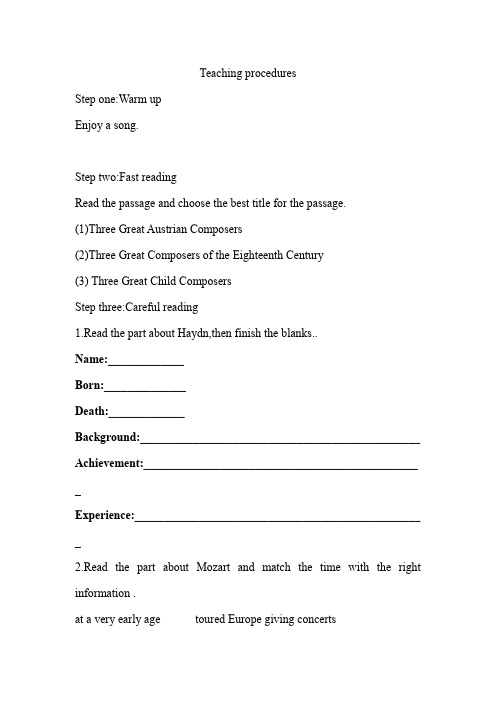
Teaching proceduresStep one:Warm upEnjoy a song.Step two:Fast readingRead the passage and choose the best title for the passage.(1)Three Great Austrian Composers(2)Three Great Composers of the Eighteenth Century(3) Three Great Child ComposersStep three:Careful reading1.Read the part about Haydn,then finish the blanks..Name:_____________Born:______________Death:_____________Background:________________________________________________ Achievement:_______________________________________________ _Experience:_________________________________________________ _2.Read the part about Mozart and match the time with the right information .at a very early age toured Europe giving concertswhen he was 4 play the harpsichord in a concert for the Empress of Austriawhen he was 5 showed musical talentwhen he was 6 learned to play the harpsichordBy the time he was 14 started composing musicWhen he was a teenager composed many pieces for the harpsichord ,piano and violin3.Read the part about Beethoven and answer the questions.(1).Who taught Beethoven how to play the piano?(2).Did he stop composing when he became deaf?Step four:Post readingHaydn, who changed the symphony into a long piece for a large orchestra, is1. (know) as “the father of the symphony”. After2. (study) music in Vienna, he worked as3. (direct)of music at the court of a prince in eastern Austria. 4. (work) there for 30 years, he moved to London, 5. he was very successful. As a genius child 6. (music), Mozart had a talent 7. music from a very early age. In his short lifetime of 35 years, he composed more than 600 pieces of music. In 1781, Mozart met Haydn and made a deep 8. (impress) of him. Beethoven moved to Vienna after Haydn’s encouragement. He 9. (stay) there for the rest of his life andcontinued 10. (compose) after he went deaf.Step five:SummarySummary1:1.How to describe a person?2. Group discussion:Describe a person you like best and give other students information by information and let them guess.Summary2: What do the great musicians have in common?How to be a successful person?( enjoy a video)Step five Homework学情分析高一12班学生聪明听话,但是英语基础比较差,英语学习习惯不好,背单词是个“永恒”的老大难问题,但是态度端正,也有学好英语的欲望,虽然不够强烈。
高中英语_【课堂实录】music教学设计学情分析教材分析课后反思
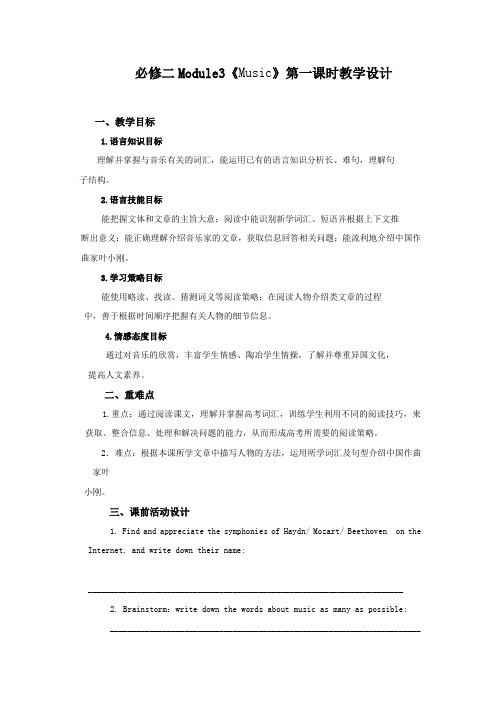
必修二Module3《Music》第一课时教学设计一、教学目标1.语言知识目标理解并掌握与音乐有关的词汇,能运用已有的语言知识分析长、难句,理解句子结构。
2.语言技能目标能把握文体和文章的主旨大意;阅读中能识别新学词汇、短语并根据上下文推断出意义;能正确理解介绍音乐家的文章,获取信息回答相关问题;能流利地介绍中国作曲家叶小刚。
3.学习策略目标能使用略读、找读、猜测词义等阅读策略;在阅读人物介绍类文章的过程中,善于根据时间顺序把握有关人物的细节信息。
4.情感态度目标通过对音乐的欣赏,丰富学生情感、陶冶学生情操,了解并尊重异国文化,提高人文素养。
二、重难点1.重点:通过阅读课文,理解并掌握高考词汇,训练学生利用不同的阅读技巧,来获取、整合信息、处理和解决问题的能力,从而形成高考所需要的阅读策略。
2.难点:根据本课所学文章中描写人物的方法,运用所学词汇及句型介绍中国作曲家叶小刚。
三、课前活动设计1. Find and appreciate the symphonies of Haydn/ Mozart/ Beethoven on the Internet, and write down their name:________________________________________________________________________2.Brainstorm:write down the words about music as many as possible:___________________________________________________________________________四、教学设计Pre-reading(一)Lead in1.Brainstorm (five minutes)Ask the students to come up with words as many as possible while looking at the picture about music.(Compete in groups)【教师活动】通过大屏幕展示学生所喜爱的国内外著名乐队、歌手、指挥、各种乐器等图片,引导学生根据图片更可能多的说出有关音乐的词汇。
高中英语_Module3 Music教学设计学情分析教材分析课后反思

Module 3 MusicI. Teaching procedures.Step 1. Warm-up and lead-in.To guide the students to sing a song before class.And then answer the question: What kind of music do you know? Step 2. Fast-reading①Read the passage as fast as possible, and then choose the best title. ☐Three Great Austrian Composers☐Three Great Composers of the Eighteenth Century☐Three Great Child ComposersStep 3.Careful-readingI. Read the Part about Haydn again and answer the questions.1.What is Haydn known as all over the world?2.How did Haydn change the form of symphonies?3.How did Haydn change the form of symphonies?②. Read the Part about Mozart again and fill in the blanks.③. Read the Part about Beethoven and complete the passage.Beethoven was born in Bonn,__________.He learned to play the _______and_______from his father. Mozart met Beethoven and was impressed by him. Beethoven met________in 1791, who encouraged Beethoven to move to ________.He became very popular. Unluckily, he went ______but continued___________.Step 4.Group workDecide if these statements are true or false.1. Haydn is known as '' the father of the symphony''2. When Mozart was four, he learned to play the piano.3. Mozart composed more than 600 pieces of music.4. Beethoven's mother taught him to play the piano.5. Beethoven continued composing after he went deaf.Step 5. WritingWrite a short passage on who is you favorite singer / musician?1.Why do you like him/her?2.Which song / piece of music do you likebest? And can you sing it?3. What else do you know about him / her?4. ...学情分析由于我校生源属中游学生较多,学生基础知识相对薄弱,词汇量少,语法掌握懂得较少。
高中英语_book2unit5music教学设计学情分析教材分析课后反思

Unit 5 Music 教学设计Period 1: Warming up and readingTeaching Aims◆To learn to talk about kinds of music◆To learn to read about bands◆To study The Attributive Clause (in/ for/ with/ by+which/ whom)◆To learn to write an e-mailProceduresI. Warming upWarming up by describingGood morning, class. Today we are going to talk about an interesting topic --- music. As we know, music is a kind of art of making pleasing combinations of sounds in rhythm, harmony and counterpoint. Music can produce a lively and happy atmosphere and bring people relaxation after hard work, which can reduce the tiredness. Listening to music also makes people feel happy and nice. How many do you know about music? Can you tell about different kinds of music? Now turn to page 33, look at the pictures, read the captions and listen to the different kinds of music. See if you can guess which music matches with which picture.Warming up by discussingHi, everyone. Do you like music? How much do you know about music? Can you tell about the different kinds of music? Please turn to page 33. Look at the pictures. Let’s listen to some music. Let’s see if you can guess which music matches with which picture.Classical music Country music Rock ‘n’ RollRap Orchestra Folk musicYes, you are right. I’m sure you will really enjoy yourselves after listening to all these beautiful music. What kind of music do you like better, Chinese or Western, classical or modern? Why? How does music make you feel? Why do you like to listen to music? Let’s discuss these questions in small groups. Try to share your opinions with one another.II. Pre-reading1.Thinking and sayingHave you heard about any of the famous bands in the world? List some if you can.For reference: I’ve heard about “The Beatles”, “Back Street Boys”, “The Eagles”, “West life” and “Pink Floyd”.2.Listening, talking and sharingLet’s listen to some pieces of music from different bands. Work in groups of four. Tell your group mates which band you like best. Why? Then the group leader is to stand up and share the group idea with the class.For reference:I am from Group 1. Our group likes “The Beatles” best. We like their style of performances. Listening to their performances, we will feel relaxed, amused, and their performances make us think a lot about life.Do you know anything about “The Monkees”?For reference: “The Monkees” is a band that was first popular in the 1960s in America. Unlike most bands of the time, the Monkees were not formed by its members but rather by TV producers. They were a fictional band in the TV show of the same name. The band was composed of Mike Nesmith, Mickey Dolenz, Davy Jones, and Peter Tork. All the members had some musical experience. Let’s come to the reading ---The Band That Wasn’t and find more about them.III. Reading1.Reading aloud to the recordingNow please listen and read aloud to the recording of the text THE BAND THAT WASN’T. Payattention to the pronunciation of each word and the pauses within each sentence. I will play the tape twice and you shall read aloud twice, too.2.Reading and underliningNext you are to read and underline all the useful expressions or collocations in the passage. Copy them to your notebook after class as homework.3.Reading to identify the topic sentence of each paragraphSkim the text and identify the topic sentence of each paragraph. You may find it either at the beginning, the middle or the end of the paragraph.3.Reading and transferring informationRead the text again to complete the tables, which list how people formed a band and how The Monkees was formed by the TV organizers and became a real band.How do people get to form a band?becoming famous.How was The Monkees formed and became a real band?The Monkees in 1968 (left to right): Micky Dolenz, PeterTork, Mike Nesmith & Davy Jonesbeginning of the band It began as a TV show.style of the performance They played jokes on each other as well as played music.first music and jokes Most of them were based loosely on the band called “The Beatles”. development of the band They became more serious about their work and started to playtheir own instruments and write their own songs like a real band.They produced their own records and started touring and playingtheir own music.changes of the band The band broke up in about 1970, but reunited in the mid-1980s.They produced a new record in 1996, which was a celebration oftheir time as a real band.4. Reading and understanding difficult sentencesAs you have read the text times, you can surely tell which sentences are difficult to understand. Now put your questions concerning the difficult points to me.IV. Closing downClosing down by doing exercisesTo end the lesson you are to do the comprehending exercises No. 1, 2, 3 and 4.Closing down by having a discussionDo you think the TV organizers were right to call “The Monkees” a band when they did not sing or write their own songs? Why?Do you agree that the jokes were more important than the music for this band? Give a reason.Closing down by retelling the form of the band The Monkees.I shall write some key words and expressions on the board. You are to retell the form of the band according to these words..•Book2 Unit5学情分析我校高一学生英语学习基础薄弱,学生出现了大面积的学习困难,不理解课文,没有自信心。
- 1、下载文档前请自行甄别文档内容的完整性,平台不提供额外的编辑、内容补充、找答案等附加服务。
- 2、"仅部分预览"的文档,不可在线预览部分如存在完整性等问题,可反馈申请退款(可完整预览的文档不适用该条件!)。
- 3、如文档侵犯您的权益,请联系客服反馈,我们会尽快为您处理(人工客服工作时间:9:00-18:30)。
Module 3 Music
Learning aims
1. To understand the introductions of the three great composers.
2. To understand the structure of the passage.
3. To learn the spirits of overcoming difficulties from the composers.
ⅠBefore-reading
Sing a song together.
Twinkle, twinkle, little star.
How I wonder what you are.
Up above the world so high.
Like a diamond in the sky.
Twinkle, twinkle, little star.
How I wonder what you are.
ⅡWhile-reading
1. Fast-reading
Listen to the video and choose the best title(标题).
A. Three Great Austrian Composers
B. Three Great Composers of the Eighteenth Century
C. Three Great Child Composers
2. Detailed-reading
1) Read the information about Haydn and fill in the blanks.
Haydn is ______ ______ the “father of the symphony” and _______ the symphony ________ a long
piece for a large orchestra. Later in his life, he _______ to London, ________ he became very _________.
2) Read the part about Mozart and answer the following questions:
①What do people think of Mozart?
②What is Mozart’s father?
③match the time with right information.
at a very early age toured Europe giving concerts
when he was 4 played the harpsichord in a concert for the Empress of Austria
when he was 5 showed musical talent
when he was 6 learned to play the harpsichord (' hɑːpsɪkɔːd 大键琴)
By the time he was 14 Started composing music
When he was a teenager composed many pieces for the harpsichord, piano and violin
3) Read the last part and answer those questions
①What happened between Haydn and Beethoven?
②How is Beethoven in the Austrian Capital?
③What happened to Beethoven as he grew older?
4) Let’s make a Summary of the whole passage.
Haydn, from a peasant family, is __________the “father of the symphony” and ________ the symphony ______a long piece for a large orchestra. Later, he moved to London, ________he became very famous.
Mozart, whose father is a _________, is possibly the greatest musical genius of all time. _____ the time he was 14, he ____________many pieces for the harpsichord, piano and violin, as well as for orchestras. When he was still a teenager, he was already a big star and toured Europe _______ concerts.
Beethoven, learning from his ______ father,______ musical talent when very young. _______ Haydn ____ encouraged him to Vienna. Beethoven became _______ in Vienna and spent the rest of the life there and ________ composing even when he began to _______ deaf.
Ⅲ Post-reading
Discuss:
What can we learn from his spirit?
What should we do in our life/ study/ difficulties?
ⅣHomework
Write a short passage to introduce a musician you like.
others’ judgments
achievements and experiences
spirits worth learning
Homework: Write a short passage to introduce a musician you like.
本节课后我们又对此课进行的观评,以下为老师的意见:
陈老师:课堂讲解精炼、细致,指令清洗、简洁;设计充分、环环相扣;板书规范。
高老师:达成度很高,学生积极参与、积极发言。
讨论环节时间充分,师生交流、生生交流贯穿整堂课。
陶老师:思维导图设计合理,引导学生思考、回答,指令明确,目标达成度很高。
一,学生已经掌握第三单元有关音乐的词汇,并对各音乐家及其作品有初步了解。
二、学生现已初步掌握阅读技巧,有一定的基础阅读能力和学习能力,在学习过程中能够独立获取知识的能力,收集、处理信息的能力和动手操作的能力等也得到加强,具备了一定的自学能力。
三、学生对于此课抱有充分的期待心理,非常希望能在这节课上得到听觉的享受。
1. 从课堂反应度来看,学生的预习效果还不错,大多数同学能够自觉预习文章,了解三位作曲家。
2. 用童谣导入,激发学生兴趣,课堂融入效果很好。
3. 采用小组合作的方式,让学生合作探究学习。
课堂讨论环节,学生讨论热烈,输出环
节积极发言。
4. 总体而言,课堂达成度很高,学生已掌握介绍人物的文章阅读和写作。
本节课将会带领学生学习介绍海顿、莫扎特和贝多芬的课文。
我们将会进行相关的读前和读后活动,训练综合技能,借助音乐名曲欣赏、音乐知识问答、音乐家介绍等多种方式活跃课堂气氛。
课后要求学生写一篇文章,简单介绍一位著名音乐家的生平和作品。
一、成功之处
1、学中,充分发挥师生双方在教学中的主动性和创造性性,激发了学生的学习兴趣,培养了学生自主学习的意识和习惯,为学生创造了良好的自主学习情境。
2、在教学中努力体现实践性和综合性,努力改善课堂教学,整体思考知识与潜力、情感与态度、过程与方法的综合,进行了启发式、讨论式教学。
3、重视了情感、态度、价值观的正确导向,培养学生健康的审美情趣,构成正确的价值观和用心的人生态度,并把这些资料贯穿于日常的教学工作中去。
4、较好的处理了基本素养与创新潜力的关系。
在教学中,注重了语言的积累、感悟和运用,注重了基本技能的训练,给学生打下了扎实的基础。
5、在教学中,遵循了学生的身心发展规律和学习规律,适当选取教学策略,促进了学生英语素养的整体提高。
二、存在的问题
1、进一步引导学生主动进行探究性学习,在实践中学英语。
2、学生的学习方法还需要进一步改善。
3、还需进一步扩展学生的阅读面,借以陶冶情操、发展个性、丰富学生的精神世界。
4、学生的综合性学习潜力还需进一步提高,能使学生就感兴趣的问题,展开讨论,发表自己的意见。
1. To help the students understand the introductions of the three great composers.
2. To let them understand the structure of the passage.
3. To make them learn the spirits of overcoming difficulties from the composers.。
